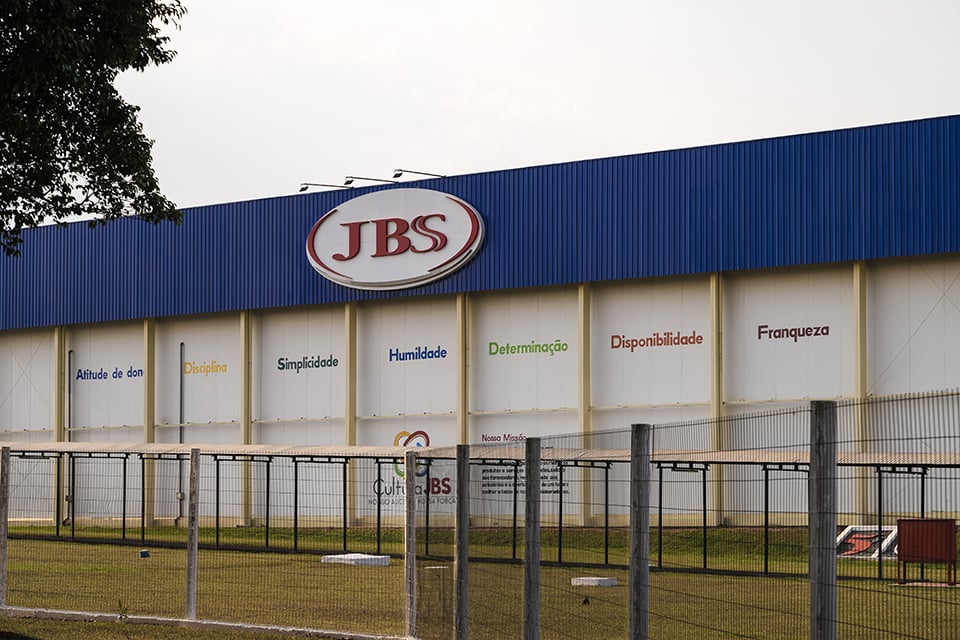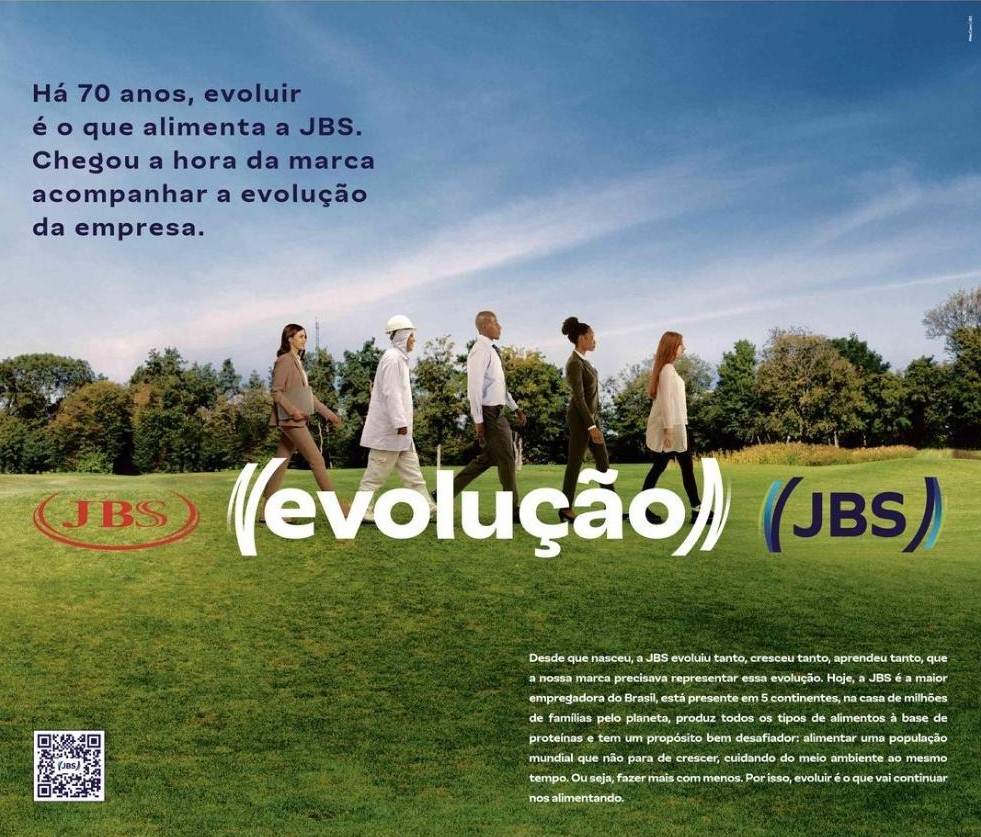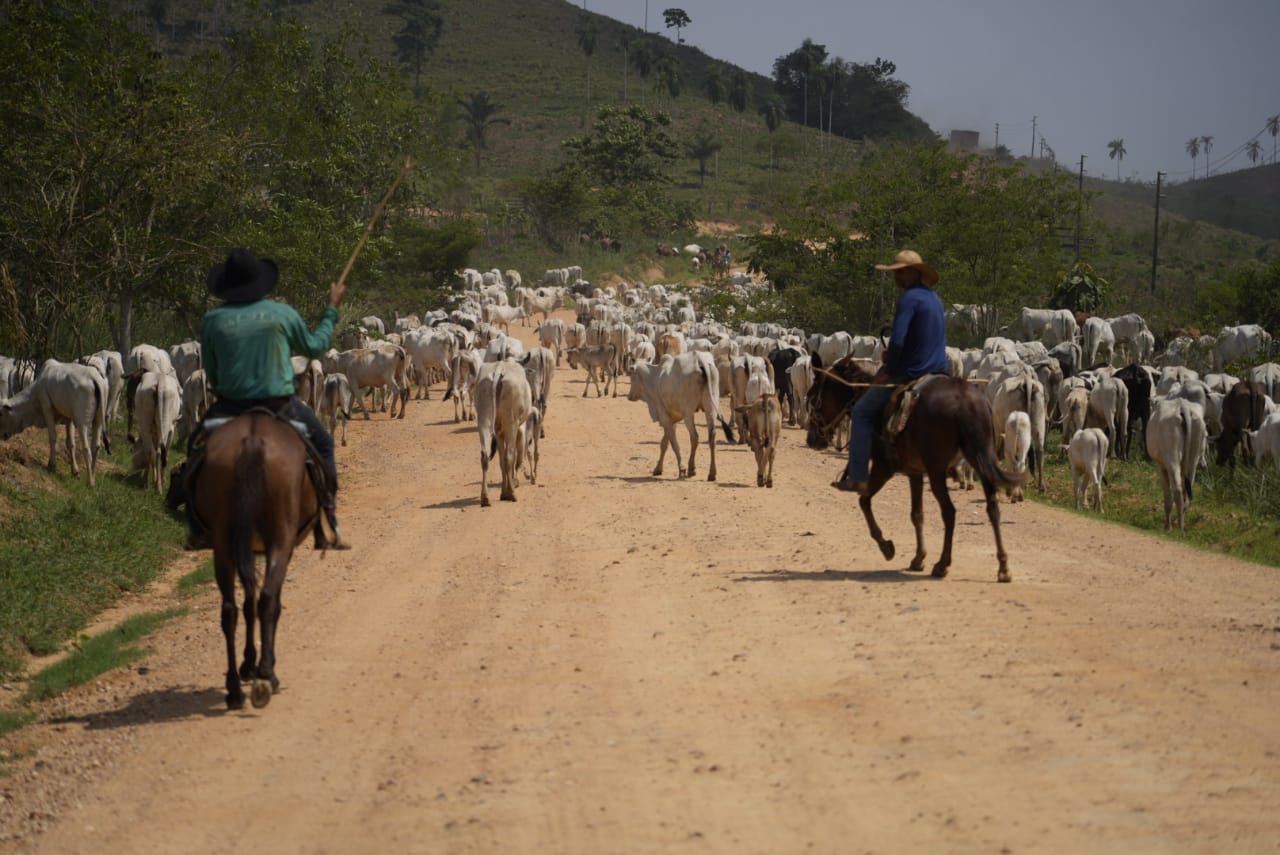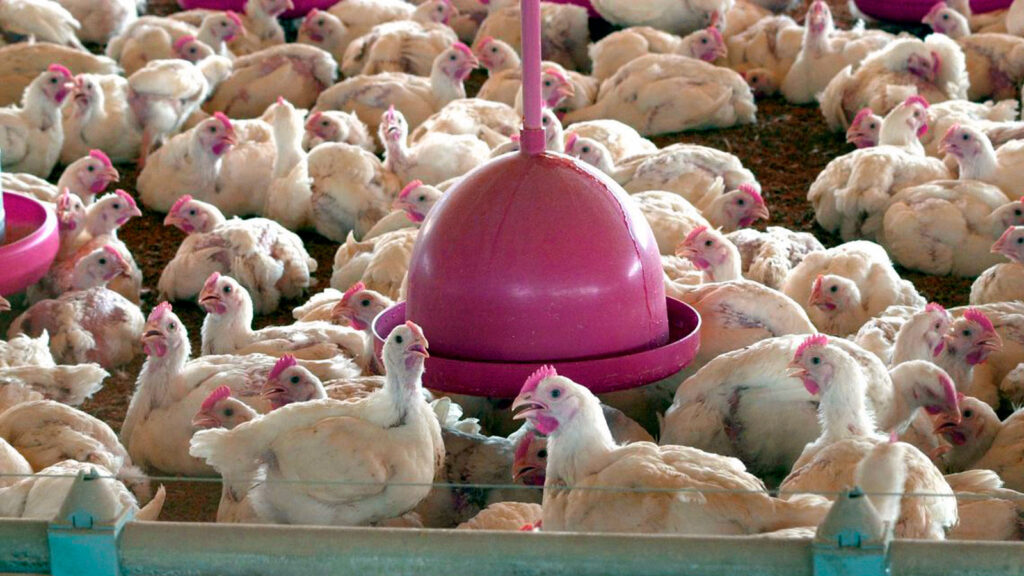In celebration of its 70th anniversary, JBS announced a new visual identity in October. The replacement of the logo’s traditional red with shades of blue and green aims to reflect the brand’s “journey of growth and evolution,” according to the company itself. The timing for the announcement is strategic: while it is negotiating to go public on the New York Stock Exchange, JBS company is under pressure to change its socio-environmental practices.

In July, during an event attended by Brazil’s Vice President and Minister of Development and Industry Geraldo Alckmin, JBS’s global CEO Gilberto Tomazoni and the Batista brothers, the company announced a new attempt to go public in the US market. The expectation was that shares would begin to be traded in 2023. However, until the end of November, the company had not received authorization from the United States Securities and Exchange Commission (SEC).
In September, 16 environmental, animal welfare and indigenous peoples’ rights organizations sent an open letter to the SEC and more than 200 investors warning about the climate and social risks linked to JBS’s practices.
“We believe investors have a fiduciary responsibility to consider the potential regulatory, litigation, reputational, ethical, and market-based risks of investing in a firm significantly implicated in and exposed to climate change, deforestation, biodiversity loss, corruption scandals and human rights abuses, whether as a parent company or through its network of subsidiaries”, the organizations state in the letter.
In the “registration statement” sent to the US SEC, JBS recognizes a series of socio-environmental risks in its business model. On page 43, the document reads: “The raising of cattle and other livestock is at times associated with deforestation, invasion of indigenous lands and protected areas and other environmental and human rights concerns.”
Still discussing the risks related to the business, the company adds that if it is “unable to ensure” that its suppliers comply with all environmental and human rights laws and regulations, JBS is subject to “fines and other penalties”, which could “affect [its] image … and results of operations.”
“It’s been years of reports of invasions of indigenous lands, deforestation, slave labour, and all of this has to be evaluated by the SEC body before the company is listed [on the New York stock exchange],” says Forest and Finance coordinator Merel van der Mark. The organization assesses funding received by more than 300 companies directly involved in the beef, soy, palm oil, cellulose and paper, rubber and timber supply chains.
Another obstacle faced by JBS was the corporate governance model it presented. According to the current terms of the agreement, the Batista family would hold 85% of voting rights, increasing their stake in the multinational by almost 36%. Experts interviewed by Repórter Brasil say that this would prevent minority shareholders from influencing the company on issues such as protection of human rights and the environment.
“The world simply cannot afford to provide JBS with greater access to finance [via capital markets] until they can show they are serious about cleaning up their emissions and operations,” says Alexandria Reid, senior global policy adviser at NGO Global Witness.
Reshaping the image without looking at the problems

Until it receives the green light from the Americans, JBS has been committed to reshaping its image. The new logo has green brackets that represent “the Company’s commitment to environmental, social, operational and economic sustainability,” according to the note released by JBS itself.
Headlines about the area of sustainability and social practices are also highlighted on JBS’s website, and the company has sponsored content focused on sustainability on media such as Valor Econômico, Exame and Poder360. Only advertising its new logo on two pages of the October 17 printed edition of newspaper Folha de S. Paulo cost around R$1 million.
Between September and October, JBS sponsored the course ‘Sustainability and Agrifood Systems,” promoted by Insper and Instituto Veja and aimed at journalists. Repórter Brasil participated in it and had the opportunity to visit the company’s facilities in Lins, São Paulo state.
Despite the effort to revamp its image, JBS continues to be publicly associated with socio-environmental practices questioned by environmental organizations. According to a survey by the Institute of Man and the Environment of the Amazon (Imazon) released this Wednesday (22), JBS is the company most exposed to risks of devastation in the Legal Amazon. The sourcing areas of its 24 meatpacking units in the region include almost 10 million hectares that are deforested, embargoed – where exploitation has been banned by the authorities – or at risk of being cleared.
Data from the Federal Prosecution Service (MPF) released this year show that the company had a 6.1% non-compliance rate in its purchases, being considered one of the worst meatpackers in Pará state in terms of livestock origin for the third consecutive year.
“Considering the size of JBS and the scope of their operations here in the Amazon, 6% is a disturbing figure,” says Imazon’s executive director Ritaumaria Pereira. “We’re not talking about one cattle head; we’re talking about direct suppliers. Now, why does this go unnoticed in their audits? I can’t answer that because if it’s such a robust system, which they’re so proud of, they should stop it at the source,” she adds.
Pereira refers to the geospatial system that the company started using after signing the Meat Conduct Adjustment Terms (TAC) with the Federal Prosecution Service in 2009, pledging to no longer purchase cattle from invaded indigenous territories or illegally deforested areas.
At an event promoted by the New York Times, the company’s Global CEO Gilberto Tomazoni stated that JBS has “zero tolerance” to deforestation and that it has stopped sourcing from over 16,000 farmers who do not comply with its code.
Asked about the matter and its difficulties to be listed on the NYSE, among other topics, the company responded that, for 15 years “it has been monitoring 78,000 potential direct livestock suppliers daily to ensure that they respect the Company’s socio-environmental criteria, and 12,000 farms have been blocked.”
Supply chain: beyond direct suppliers

The problem with Brazil’s meat supply chain is not restricted to direct suppliers. In 2022, a Repórter Brasil investigation revealed that cattle ranchers illegally established in the Apyterewa Indigenous Land – the most deforested in the Amazon in the last four years – indirectly supplied cattle to JBS.
“The company tries to distance itself from its responsibility, suggesting that the invasion of indigenous lands is an almost natural phenomenon and a result of cattle ranching, thus minimizing the seriousness of the act and its culpability. But it is totally the opposite. The invasion of indigenous lands is facilitated and funded by meatpacking companies, which, in disregard of the law, source cattle from indigenous territories,” states the document sent to the SEC by representatives of the indigenous land.
Monitoring indirect producers is an old demand from investors, consumers and authorities. Trying to solve this problem, JBS cattle suppliers can voluntarily register on the Pecuária Transparente platform and analyse the environmental and social risks of their own suppliers since 2020. The company states that “after January 1, 2026, only producers registered on it will be able to do business with the company.”
For Daniela Montalto from Greenpeace UK’s Forests and Food Campaign, JBS’s actions are still ineffective. “Given the urgency of the global climate and environmental emergency, initiatives such as the new commitment of JBS’s supply chain in the Amazon, based on self-regulation of voluntary commitments, are a decade behind in terms of execution and scope. They do not represent a decisive contribution to the fundamental change in the global food system required by science and that companies, financial institutions and governments need to implement,” Montalto concludes.

